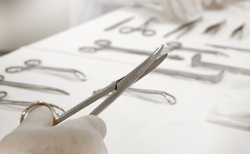
People have a horrible fascination with surgery. Flesh being altered, repaired, and restored to full functionality. The tools used for surgery have been used in hospitals and horror films. Whether you’re a professional or simply interested in various medical shenanigans, here are some surgical instruments commonly employed when a patient is under the needle.
Surgical Scissors: Large, Small, and Flat Out Scary
These sharp, metal things that go “snip!” might, on first glance, remind you of something you’d use while scrapbooking. But remember, the medical field uses scissors for everything from getting clothes off of a patient in the ER to performing delicate eye surgery with iris scissors.
Finding surgical scissors for sale will allow you to have the cutting power at your fingertips!
Forceps: Clamping Your Way to Success
At a casual glance, forceps look like scissors. Until you realize that instead of sharp edges, they have flat clamps. Kelly forceps, among many others, are used during surgery to keep flesh out of the way, or held together. They are what can often be seen in surgery photos as holding incisions open when a person is on the operating table.
Needles, Needles Everywhere—!
Does anything freak patients out quite like needles? Even routine shots can result in kids screaming in terror—before the needle ever gets close to their skin. Yet no needle looks as wicked as a jamshidi bone marrow biopsy needle. It’s big and, well, pointy. The needle for bone marrow aspiration is no better.
Yet a needle doesn’t have to be big to be terrifying. Whether a regular needle or a special needle, the pointy things have a special ability to cause children and adults alike to sweat.
Scalpel Me Tenderly
Few surgical instruments provide the slicing power and precision that the scalpel does. A doctor can use it to carefully provide access to a problematic area, while using the above clamps to keep the incision open.
As you can see, surgery is like a concert of many small tools working in sync with each other while in the hands of a skilled practitioner. Despite the horror associated with many of these tools, they save the lives of those whom go under the proverbial needle.
Getting quality tools for surgery will help the doctor work efficiently and effectively, making good instruments a critical step for any serious medical facility. And remember, with a keen eye for shopping, getting good tools doesn’t automatically mean spending a premium!
Surgical Scissors: Large, Small, and Flat Out Scary
These sharp, metal things that go “snip!” might, on first glance, remind you of something you’d use while scrapbooking. But remember, the medical field uses scissors for everything from getting clothes off of a patient in the ER to performing delicate eye surgery with iris scissors.
Finding surgical scissors for sale will allow you to have the cutting power at your fingertips!
Forceps: Clamping Your Way to Success
At a casual glance, forceps look like scissors. Until you realize that instead of sharp edges, they have flat clamps. Kelly forceps, among many others, are used during surgery to keep flesh out of the way, or held together. They are what can often be seen in surgery photos as holding incisions open when a person is on the operating table.
Needles, Needles Everywhere—!
Does anything freak patients out quite like needles? Even routine shots can result in kids screaming in terror—before the needle ever gets close to their skin. Yet no needle looks as wicked as a jamshidi bone marrow biopsy needle. It’s big and, well, pointy. The needle for bone marrow aspiration is no better.
Yet a needle doesn’t have to be big to be terrifying. Whether a regular needle or a special needle, the pointy things have a special ability to cause children and adults alike to sweat.
Scalpel Me Tenderly
Few surgical instruments provide the slicing power and precision that the scalpel does. A doctor can use it to carefully provide access to a problematic area, while using the above clamps to keep the incision open.
As you can see, surgery is like a concert of many small tools working in sync with each other while in the hands of a skilled practitioner. Despite the horror associated with many of these tools, they save the lives of those whom go under the proverbial needle.
Getting quality tools for surgery will help the doctor work efficiently and effectively, making good instruments a critical step for any serious medical facility. And remember, with a keen eye for shopping, getting good tools doesn’t automatically mean spending a premium!
 RSS Feed
RSS Feed